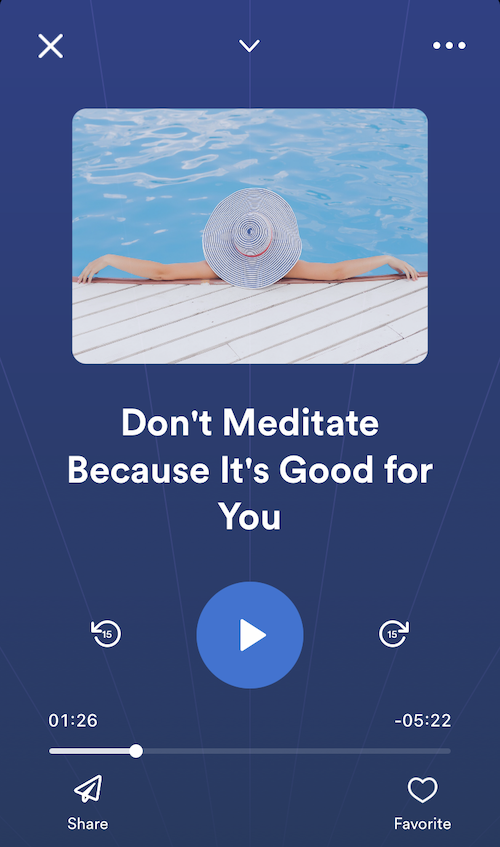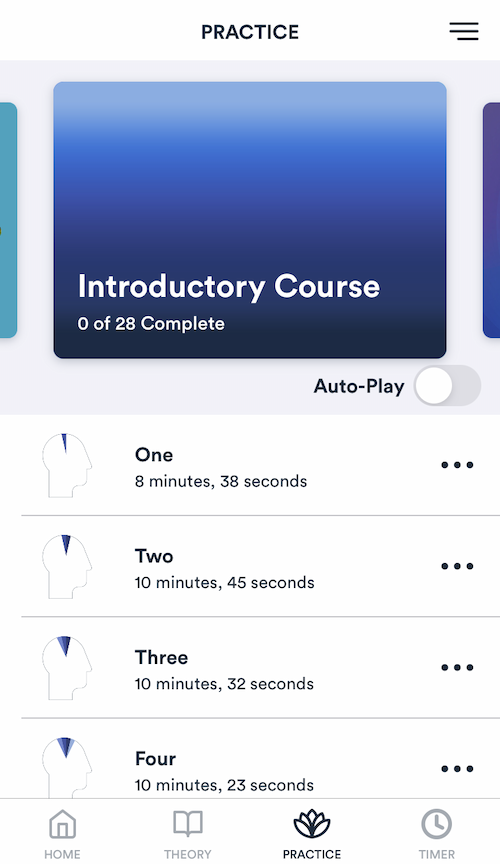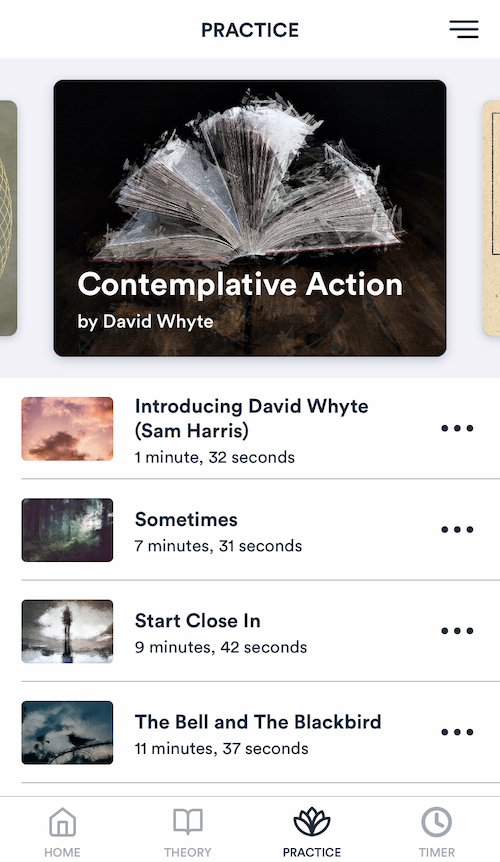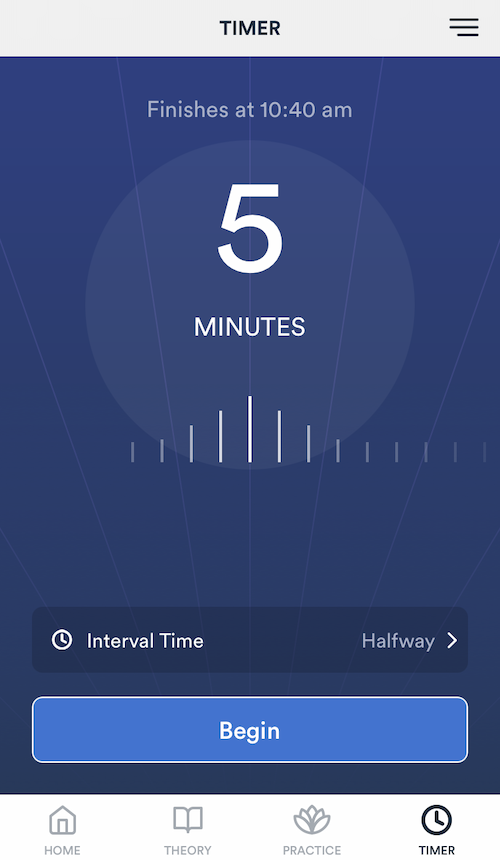“Discover your mind.”
Developed by neuroscientist, philosopher and New York Times best-selling author Sam Harris, the Waking Up app is based upon Harris’ 2014 book of the same name. Unlike other meditation apps, which aim to reduce stress or help one to feel better in the moment, Waking Up adopts the slightly more ambitious approach of aspiring to help each user “make fundamental discoveries in the laboratory of [their] own mind”. In this way, Waking Up differentiates itself from other apps through its arguably more intellectual approach to the concepts of mindfulness and meditation.
Waking Up App Features
Sleek, uncluttered and intuitive, Waking Up is remarkably straightforward to navigate and divides itself into three main sections: theory, practice and a timer for unguided meditation.
Learning the the theory of meditation
Designed to inform and deepen one’s experience of meditation, the Theory section of Waking Up is arguably one of its greatest strengths. This section is subsequently separated into lessons: short talks on different aspects of meditation; conversations with spiritual teachers and authors such as Mingyur Rinpoche and Jack Kornfield, and questions and answers with Harris, who is occasionally joined by other guests.

I particularly enjoyed the lesson “Don’t Meditate Because It’s Good For You”. Here Harris encourages us to reconsider our reasons for meditating, suggesting that a practice motivated solely by its health benefits and stress-reducing impacts is perhaps misguided, and that there are deeper, far more fulfilling reasons to live an examined life. Similarly rich with thought-provoking insights is Harris’ conversation with David Treleaven on the relationship between mindfulness and trauma- though all exchanges within this section are highly worth listening to.
Practicing meditation
Upon opening the Practice section of the app, we are invited to participate in an introductory course, comprising twenty-eight short meditations designed for the complete beginner to undertake over the course of a month. Day One opens with five minutes of guided meditation, in which Harris encourages us to pay attention to the sensations of breathing, with sessions gradually increasing in length and complexity as the course progresses.

Unfortunately, this is where the weaknesses of the app begin to show, as Harris moves at a pace that would seem incongruent with the progress of someone completely new to meditation. By Day 14, for example, Harris requests that we “relax the concept of the body” and “examine the difference between attention and consciousness”, which feels entirely too advanced to be aimed at a beginner with less than three hours of cumulative meditation experience. Even as someone who began practising over three years ago, I often struggled to deeply touch the concepts that Harris was describing before he was already moving on, resulting in a slightly frustrating experience. In this way, I feel that the introductory course lacks the spaciousness for one to be able to organically experience new insights, which are instead perhaps pressed upon them.
A diverse range of themed practice courses
Luckily, following the completion of the introductory course, we are able to access a vast range of diverse meditations. This includes a section on Metta (loving-kindness), which is thoughtful and effective in its guidance, as well as a short course on mindfulness for children- ideal for parents wishing to nurture this quality in the youngest members of their family. In addition, Waking Up also provides a daily meditation, as well as the opportunity to explore aspects of different traditions and schools of thought, such as Stoic philosophy and the concept of koans from the Japanese Zen tradition. Well-curated and ambitious in scope, it is clear that Harris has spent much time creating and compiling a range of meditations that are accessible to all, regardless of religion or belief, and that he has indeed been successful in achieving this goal.

In particular, I was moved by the “Contemplative Action” strand of this section, comprising a series of poems and reflections by poet and author David Whyte. In a soft, lilting voice with gravelled undertones, Whyte somehow manages to express feelings and concepts that often seem impossible to adequately articulate through words, such as becoming, belonging, love, mortality and endings. As someone processing loss in various forms, and with the strength of personal grief often seeming beyond the reach of language, I found myself to be profoundly, unexpectedly touched by Whyte’s poems, their vivid natural imagery, and the sense of wisdom and presence that they contain.
It is worth noting that the Practice section of Waking Up therefore does not consist entirely of conventional guided meditations, for in “Contemplative Action” there is no call to focus on the breath, but rather the simple encouragement to allow Whyte’s thoughts to gently replace one’s own. Similarly, in other parts of this section such as “The Stoic Path”, teachings and insights generally outweigh the provision of guided instruction, meaning that Waking Up may not be aligned to those seeking intensive meditation practice, but rather to those looking to explore different approaches.
The Waking Up Meditation Timer

The final section of the app is the Timer: ideal for unguided meditation once a regular practice has been established. Unlike other apps such as Insight Timer, the Waking Up app only offers a single choice of bell for which to mark the start and end of one’s meditation or its desired intervals; however, this simplicity may be welcomed by those who would find it distracting to be presented with a vast array of sounds. The user can select any number of minutes up to an allotted time of two hours in length, allowing them to set their own intentions and tailor their practice to work within the boundaries of everyday life.
How much does a Waking Up subscription cost? Is it worth it?
At the start of the theory section of the app, Sam Harris expresses his intention for creating Waking Up: to build the resource he wished he had been able to access when he began practising meditation. This sense of integrity, and Harris’ genuine desire to help others, is very much reflected in the app’s pricing options. Although Waking Up is more expensive than some meditation apps (priced at US$119.99 per year or US$19.99 per month), Harris offers a free thirty-day trial, and potential users are also able to request a free one-year subscription if they are unable afford the cost. Furthermore, Harris also offers a full refund to anyone who subscribes to Waking Up but does not find it to be valuable, meaning that a subscription poses little risk for financial dissatisfaction and is fully accessible to everyone, regardless of current economic circumstance.
Waking Up can also be used free of charge without a subscription; however, the extremely limited nature of accessible content means that this is not a particularly viable option. If a user chooses not to subscribe, for example, they will only be able to access the first five days of the introductory course and less than a quarter of the lessons in the theory section, leading to a fragmented and ultimately dissatisfactory experience.
Final thoughts
It is clear that the Waking Up app has very much been a labour of love on the part of Sam Harris: well-curated, insightful and innovatively combining theory and practice, it is ideal for anyone looking to explore meditation from a secular, more intellectual standpoint, and who wishes to further their understanding of the mind and live a deeper, more examined life. Due to the complexity and somewhat advanced nature of the introductory course, I would be reticent in recommending the app to anyone who has never meditated; however, for those with prior meditation experience, I would do so fully.
I’m trying to figure out if am learning anything worthwhile or gaining valuable skill and insights by using Sam Harris’ Waking Up app. I pose this question because I have been using it for several months now and increasingly finding it to be focusing in on what can almost be called an ideological/ philosophical point of view. A kind on non-dualistic Scientifics if that makes sense.
Sam Harris makes pretty bold claims to the “process/method” he espouses: That they can effectively “end suffering” and negative emotions. My experience has been that it has assisted in the reduction of anxiety fixations which are distracting and reduce quality of life. However, it might well be the case that I was on this path before the app.
The questions I am seeking to address are: First, am I being indoctrinated? Second, If so, does it matter? Third, how much should I consider the source of this indoctrination? Fourth, is my analysis of this source so overly biased that my judgement is clouded and conclusions I might reach of dubious use?
Let’s touch on the fourth question first. Of the 32 (as of this writing) individuals Harris interviews in his app, 30 are white and 25 are male. There are 2 men of color and 5 white women. Moreover, Harris is a vocal opponent of the “woke” movement (despite the irony of the name of his app…). Now there is obviously no quota system in mindfulness. Nor is opposition to what you characterize as over the top political correctness turned ridiculously punitive a sign of poor character. Is it fair to suggest that Harris offers the white, western male view of mindfulness? Is there even such a thing? Is this very essay an exercise in out-of-control wokefullness Harris and others so vehemently appose?
Rather than speculate on the above, I will simply turn things around a bit. If the app were produced by a man from Indian descent and the vast majority of interviews were with other Indian men, what would our thoughts be about the origins of the app? I’m going to add that Sam Harris is not, in my mind, ethically required to interview anyone of any specific race, sex, national origin, or anything, to get his point across. However, in the current social context his choices do say something.
From an extreme and inflammatory point of view one can suggest that being a Nazi does not disqualify one from being instructive in rocket science. While this is a cheap shot, it does raise the issue of jealousy of his relative success as a white male. My jealousy. This is a bit unfair to me, however and “success” is clearly contextual. I really don’t know anything about Sam Harris, so giving him the benefits of the doubt when it comes to whether he is evil or not seems the only route. But let’s be clear and honest here, I am questioning something. One can’t position oneself as anti-woke while at the same time maintaining such an abysmal equity record without raising suspicion (as ridiculous as this sounds).
It seems fair to say that Sam Harris is preaching a Western response to Eastern Thought. Perhaps this is why it is so the extreme white male. Can we accept this without being judgmental is the question. Actually, more important is if Sam Harris is offering to me, another white male, techniques to reduce my anxiety and generally get to know myself better, why bother with any of these issues? Or is that like buying something made unsustainably? Just how onerous is Sam Harris even if the worst of what we might suspect is true?
We kind of have to say, “not very,” or perhaps “not at all.” Maybe for some this would be an act of Christian Charity. For me, some sort of forgiveness is involved. The sins of the anti-woke white patriarchy are grievous. Unless there is a deliberate conscious bent to Sam’s approach to mindfulness, the ignorance, and especially the denial, of the bias is incriminating in some form.
The question for the consumer (me) is if the bent of Harris is enough to eschew the product. Again, “not very,” or “not at all.” But the awareness of it as a particular product of the patriarchy gives it an edge of suspicion. I’m wondering if there might be another perspective out there equally as effective that I can” buy into.” Something not presented by Sam and dozens of other cisgender white dudes.
I think Sam might argue that when it comes to mindfulness and consciousness, or even science, none of this has much to offer. At this point I am assuming this to be so as I continue to believe that the Waking Up podcast is offering me something even while I am simultaneously coming to believe the anti-woke crusade as embodied by Harris is a bit unsavory. Is Charles Murray and his publications truly “important” in the academic sense of the term? What hill would you rather make a last stand on, Murray’s or Floyd’s? We kind of suspect where Harris stands. It is a bit icky and it does make me want to delete his app from my phone.
Am I being indoctrinated? I think this question is after the fact. I already have been indoctrinated long before Harris came along. I suspect that Sam’s app is of use to me precisely because I share his cultural baggage. Does this matter? Maybe so since it has become a concern. I am no longer engaging with the app as a tool, if I ever was, but much more holistically. The fact that it is Sam Harris’ voice I am hearing while in an induced state of near hypnosis is not insignificant. This is something I’m thinking it might be better to avoid if I truly want to “wake up” to better world. But I’m not sure…Thoughts?
Interesting thoughts Rob. I wasn’t aware of Sam Harris’s political views on “wokeness”, I suppose because he keeps more on-topic (keeping a meditation & mindfulness focus) in the app. I haven’t listened to his podcast which I presume goes more into current, topical discussions.
Personally I do not care much about a meditation teacher’s politics. If they can teach meditation well, it doesn’t matter to me whether they hold liberal or conservative, whether they believe in capitalist or socialist economics, or whether they agree with so-called “woke” views or not. To me, all of these are valid views, I don’t like to associate too much with a single “side” and with appropriate compassion and understanding I think such diversity of thought is wonderful and healthy.
Hi Rob,
Thank you for taking the time to write this response. I wasn’t aware of Harris’ political and ideological leanings when writing the article, which I guess allowed me to review the app from a space of neutrality. Whether the value of Waking Up is diminished by Harris’ views on other subjects (or associations with Charles Murray) is perhaps a matter of individual perception.
I know that I would personally feel uncomfortable closely engaging with an author/creator’s work if I strongly disagreed their moral stance- particularly in the realm of meditation or spirituality in general (for me the two are inextricably linked- Sam Harris may disagree 🙂 ). In this case though, I haven’t actually listened to Harris’ conversation with Murray, so am unsure of whether he shares the same viewpoint. This makes me reluctant to pass judgement, which is perhaps open-minded or willfully ignorant- or a little of both.
I guess that it poses the course of action of simply using a different app if one finds Waking Up to be ethically problematic – though in doing so, we perhaps avoid the discomfort in hearing out views that oppose our own.
I feel that there is no single, “right” answer to this question of ethics, so maybe the best thing to do is simply to act in a way that feels intuitively true and moral to us as individuals- whether that involves using the app in a conscious or critical way, or avoiding it in exchange for a different programme/meditation teacher instead 🙂 .
Your whimsical, treading on eggshells inner narrative is everything that is wrong with “woke” culture. While you try to please everyone, you sit eternally on the fence and please nobody.
Pick a side and trust your instinct.
You can question the integrity of his motives, but I think you’d find more benefit questioning your own.
Thank you Ena for this excellent review. I have been trying the Waking Up app myself for a couple of months now, and at this stage I’ve completed the 30 day introductory course and dipped into some other parts of the app, particularly in the theory section.
I agree with your thoughts on the weakness of the Practice section. I found the language in the guided meditations somewhat academic, which threw me a bit as I see meditation as a non-verbal practice, but I found his words got me thinking rather more than would be ideal. So I would not recommend the Waking Up app for beginners, unless I felt they would be particularly attracted to this intellectual approach to meditation.
For more experienced meditators (like you or I) I also wouldn’t recommend the app for the Practice section, but I find the Theory section fascinating. Meditation must be practised and experienced to really benefit from it, but I find that understanding meditation from a scientific perspective is hugely motivational. Sam Harris’s background in neuroscience and philosophy, combined with his years of experience of meditation and retreats make him ideally suited to this.
When listening to Sam Harris discuss the theory of meditation, I find this reminiscent of listening to an old Alan Watts lecture. My mind feels stimulated, and my perspective is challenged, though with Sam Harris I feel the approach has more basis in Western science and philosophy, which increases my confidence in his “teachings” even if his way of speaking is less inspiring than Alan Watts.
So on the basis of the theory section alone, I would recommend trying the Waking Up app for experienced meditators. However, it can be cheaper to start with his book of the same name (Waking Up: A Guide to Spirituality Without Religion) which also covers the theory of meditation. I’m listening to the audiobook edition now, and so far I’m impressed!